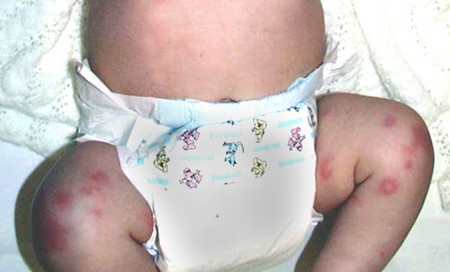Urticaria is an allergic reaction when the skin erupts into itchy raised white wheals, surrounded by red inflammation. The wheals are caused by the body releasing histamine. These may appear in small patches, or cover large areas of the skin, anywhere on the body. The condition is not usually serious and the wheals tend to disappear within seventy-two hours. Other symptoms may include fever, fatigue and nausea.
Certain types of food are known to cause an allergic reaction in susceptible children which can trigger urticaria. Common allergens are milk, strawberries, shellfish, onions, beans, nuts, potatoes, spices, and food additives, particularly tartrazine (El02). Other known triggers are insect stings or bites, some plants, penicillin, mould, animal dander, aspirin and even bacterial or viral infections.
Susceptibility to urticaria can disappear in due course, but for some, repeated exposure to the allergen can make the condition chronic.
What you can do
Try to be aware of any foods or other triggers that cause your child to break out in hives. Avoid any known allergens as much as possible and alert your child’s school, if you feel it is necessary. Keep the area cool and apply Calamine lotion to relieve the itching. Adding three tablespoons (45ml) of sodium bicarbonate to relieve the itching, or a cupful of vinegar, to the bath may help calm the skin down.
Treatment
Naturopathy
If your child is allergic to aspirin, they may also be allergic to foods that contain salicylates, a natural compound used in aspirin. So a naturopath may suggest trying to cut down on foods high in salicylates, such as most fruit, particularly dried fruit and berries, a variety of herbs and spices, liquorice and peppermint. In lower levels, salicylates can also be found in nuts, seeds, fish, pulses, grains, dairy products, meat and vegetables. No elimination diet should be followed without careful supervision and, unless the urticaria is a repeated problem, it is probably not necessary.
Homoeopathy
A homoeopath may recommend Urtica Urens or Apis which will help to relieve the itching, particularly if the wheals are sensitive to touch. If your child suffers a particularly acute reaction, Aconite may be advised.
Herbal medicine
To treat the actual itching, a herbalist may recommend an infusion of Chamomile, to help relax the child and soothe the inflammation, or Chickweed which can help to relieve irritation and can also be applied as an ointment or poultice. An Aloe Vera gel will also soothe the area, particularly if mixed with a Chamomile cream. Osteopathy An osteopath will work to try and boost the immune system by decreasing the mechanical strains in the body. This may be done through cranial work to enable the release of more energy to fight off disease and to improve the interchange of fluid between tissues, for instance blood and lymph fluids.
Caution
If urticaria develops in or around the mouth, seek immediate medical attention as it may cause swelling of the tongue or throat and lead to breathing difficulties.
